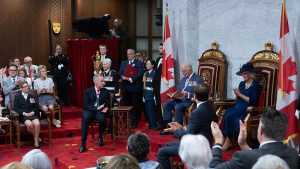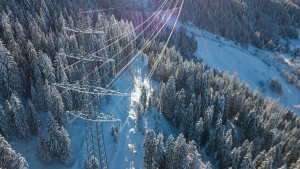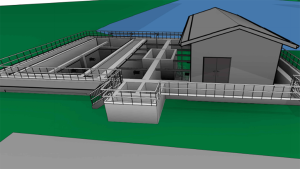The Canadian GeoExchange Coalition (CGC) has announced a new training and accreditation framework designed to raise the professional bar in the design and installation of ground source heat exchange systems.
Accreditation
TORONTO
The Canadian GeoExchange Coalition (CGC) has announced a new training and accreditation framework designed to raise the professional bar in the design and installation of ground source heat exchange systems.
“We’ve developed the course training material with the assistance of about 50 top industry professionals,” says Ted Kantrowitz, director, Business Development with the CGC.
The courses were designed around the requirements of the Canadian Standard Association’s C-448-02 which reflects the Canadian experience with heat exchange technology.
As of January 1, the CGC ceased to recognize other geothermal training programs.
“Our stakeholders have been very vocal that the current situation was no longer viable,” says CGC executive director, Denis Tanguay. “There are too many training programs available with little or no oversight to ensure quality of course content, delivery and examination.”
"We realized we had to put these training programs together quickly."
Ted Kantrowitz
CGC
The CGC is offering four courses to installers, drillers, commercial system designers and residential system designers. While the installer and driller courses require no prerequisites, the commercial and residential designer courses require successful completion of the installer’s course. Courses take from two to four days to complete.
The educational program is a response to industry demand and the increased popularity of geothermal systems.
“We realized we had to put these training programs together quickly,” says Kantrowitz. “The overall CGC Global Quality GeoExchange Program is one of the world’s most stringent.”
Those who successfully complete the educational programs will be given a certificate, but full accreditation will require additional steps.
Certified applicants will be required to present a series of credentials to the CGC for verification, including: demonstrated field work experience in the geothermal sector; full liability coverage, if and where appropriate; provincial work permits and papers; adherence to CGC code of conduct; professional references; supervised or inspected installations; and, a workmanship guarantee. CGC does not require participants to join the association in order to enroll in courses or to receive accreditation.
“We didn’t want the program to be perceived as a membership drive,” says Kantrowitz.
Accreditation will be valid for three years with a non-automatic renewal. CGC accredited professionals can submit completed projects to the coalition for system certification.
The CGC program will also help to ensure that government subsidies for geothermal systems will be applied to projects that are professionally designed and installed.
“Canadian incentive programs are increasingly referring to Canadian training, accreditation and certification,” says Kantrowitz. “All levels of government, from municipal to federal have the option of referring to this new Canadian industry standard.
“Hydro-Québec has already announced that anyone receiving the utility’s incentive for installing geothermal systems will require CGC project certification.”
Kantrowitz notes that increasingly, commercial projects are relying on geothermal heat sources, a fact that will be reflected in an expanded commercial education component in future CGC course offerings.
Courses are already being conducted in several provinces, with further course roll-outs being offered across the country in the coming months.
The first Ontario courses will be offered in the Toronto area in June, in co-operation with the Energy Efficient Contractors Network, a project of the Canadian Institute of Plumbing and Heating, and the Electrical Contractors Association of Ontario.










Recent Comments
comments for this post are closed